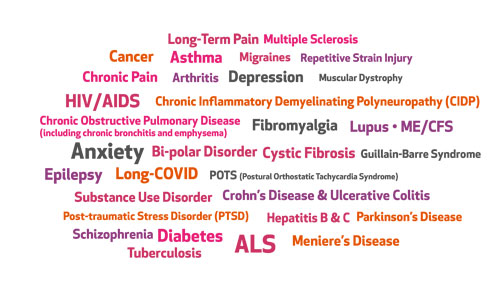Blog /
Understanding Episodic Disabilities at Work Is a Growing Business Priority
Understanding Episodic Disabilities at Work Is a Growing Business Priority
This blog was provided by Realize Canada.

This blog was provided by Realize Canada.
On March 20th and 21st this year, Realize will host the 4th National Virtual Summit on Episodic Disabilities and Employment. According to Melissa Egan, the organization’s National Lead, Episodic Disabilities, “over 400 business leaders, human resources professionals, researchers and others across Canada have registered for this year’s event already. We are on track for a record number of participants.”

Egan is not surprised. “In my work, I’m in constant contact with employees who are struggling with the uncertainty of how their episodic conditions will affect their jobs, and with employers who are trying to come to grips with an increasing number of employees or prospective employees who experience episodic disability. Business leaders, and HR professionals in particular, are looking for answers on accommodation best practices and other approaches that will help them become disability-confident employers.”
This increase in episodic disabilities in the workplace is well-documented. On December 1st, 2023, Statistics Canada released preliminary findings from the 2022 Canadian Survey on Disability (CSD). The survey found that “27% of Canadians aged 15 years and older, or 8.0 million people, had one or more disabilities that limited them in their daily activities. The rate of disability in Canada has increased by 5 percentage points since 2017.” (Statistics Canada, 2023) There is a complex array of factors driving this increase across the country, including the rising number of people reporting long-term effects of COVID infection, however, the two most significant factors Statistics Canada has identified are, “the aging population and the large increase in mental health-related disabilities among youth and working-age adults.”
Egan notes, “many business leaders have recognized this significant shift in the workforce but are still trying to figure out what it means. Current workplace practices and processes are often not adequate for these new workplace dynamics. At Realize, we conduct recurring surveys of HR professionals across the country and respondents consistently report having received little to no formal training on episodic disabilities or how to accommodate employees with these conditions.” (Realize survey report 2022).
What is an episodic disability? Episodic disabilities are chronic health conditions characterized by fluctuating periods and degrees of illness and wellness. These periods can be unpredictable in duration, types of symptoms and frequency of recurrence. For example, a person who is living with rheumatoid arthritis or depression might be well for several months, and then experience several episodes of illness in a row. Each episode may be different in terms of the symptoms experienced, how long it lasts and how intense the symptoms are. (Realize)
The unpredictability of these conditions can be hard to manage for employees and employers, but Egan points out that, “businesses that build flexibility into their HR systems and workplace practices are better able to adapt.”
The upcoming National Summit on Episodic Disabilities and Employment is an opportunity for business leaders, human resources professionals, managers, people living with episodic disabilities and others to create links between valuable research and actionable workplace solutions. According to Egan, “it is designed to catalyze workplace change through sharing best practices and highlighting key research.”
4th Annual National Summit on Episodic Disabilities and Employment
Moving from Knowledge to Action
Dates: March 20th & 21st 2024
Times: 12pm – 3:30pm (Eastern Time) each day
Place: Virtual meeting on Zoom
Registration: Free

Related News

Employee Education is a Critical Defence Against Cyber Attacks

How Your Organization Can Quantify and Reduce Your Cyber Risk




